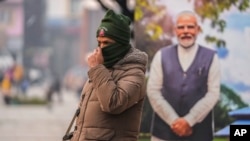India's top court upheld on Monday a move by Prime Minister Narendra Modi's government to revoke the limited autonomy of Muslim-majority Kashmir, where an insurgency has raged for decades, and ordered elections within a year.
The 2019 declaration was "a culmination of the process of integration and as such is a valid exercise of power", the Supreme Court said in its verdict.
The move was accompanied by the imposition of direct rule from New Delhi, mass arrests, a total lockdown and communication blackout that ran for months as India bolstered its armed forces in the region to contain protests.
Modi's muscular policy has been deeply controversial in Kashmir but was widely celebrated across India, with the insurgency that claimed tens of thousands of lives over decades largely quietened.
The removal of Article 370 of the constitution, which enshrined the Indian-administered region's special status, was challenged by Kashmir's pro-India political parties, the local Bar Association and individual litigants, culminating in Monday's verdict.
The court upheld removing the region's autonomy while calling for Jammu & Kashmir, as the Delhi-administered area is known, to be restored to statehood and put on a par with any other Indian state "at the earliest and as soon as possible."
The court also ordered state elections to take place by September 30, 2024.
Security was stepped up across Indian-administered Kashmir ahead of the verdict, with authorities deploying hundreds of soldiers, paramilitary troops, and police in the main city of Srinagar to thwart any protests.
Modi welcomed the judgement as "historic".
It was "a beacon of hope, a promise of a brighter future and a testament to our collective resolve to build a stronger, more united India", the Hindu nationalist leader posted on X, formerly Twitter.
Removing Article 370 has been a key plank of his Bharatiya Janata Party's platform since its inception, and the Supreme Court decision comes ahead of elections next year.
Former Kashmir chief minister Mehbooba Mufti -- who governed in coalition with the BJP but whose party was among the litigants in the Supreme Court case -- condemned the ruling as a "death sentence not just for Jammu and Kashmir but also for the idea of India".
Pakistan reaction
Pakistan swiftly denounced the Indian court ruling and dismissed it as an attempt by New Delhi to annex Kashmir.
“The judicial endorsement of India’s unilateral and illegal action of 5 August 2019 is a travesty of justice based on distorted historical and legal arguments,” Foreign Minister Jalil Abbas Jilani told a hurriedly called news conference in Islamabad.
He insisted that the verdict “has no legal value” and "fails to recognize" the internationally accepted nature of the Kashmir territorial dispute between the two countries.
Kashmir has been divided between India and Pakistan since the neighbors were granted independence from British rule and partitioned in 1947, when its Hindu maharajah chose to join the new secular and federal Union of India.
Initially New Delhi controlled only foreign affairs, currency, and communication, but over the decades Kashmir's pro-India leaders cooperated with national authorities to dilute the provision.
Both India and Pakistan claim the Himalayan former kingdom in full and the nuclear-armed rivals have fought two wars over control of the region.
'Moral compass'
One of the advocates who argued for the revocation to be ruled unconstitutional -- the Supreme Court held hearings on it for 16 days -- was sanguine.
"Some battles are fought to be lost," Kapil Sibal posted on X, even before the verdict was read out, saying the court action was intended to ensure that "history must record the uncomfortable facts for generations to know".
"History alone is the final arbiter of the moral compass of historic decisions," he added.
Since the suspension of Article 370 Indian authorities have curbed media freedoms and public protests in a drastic curtailment of civil liberties.
The changes allowed Indians from outside the region to buy land in it and seek government jobs and education scholarships, a policy denounced by critics as "settler colonialism".




